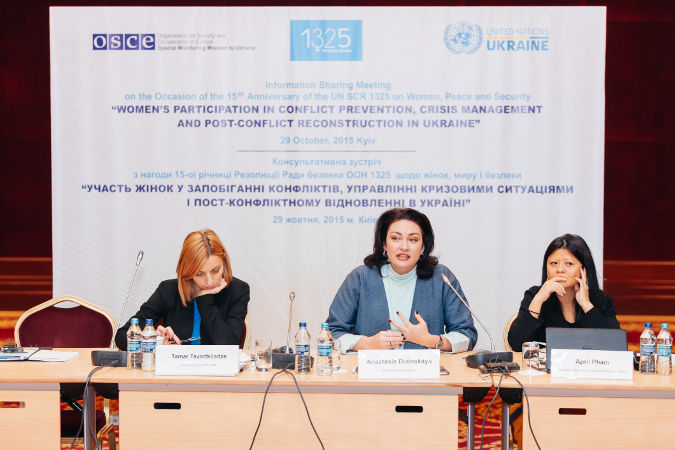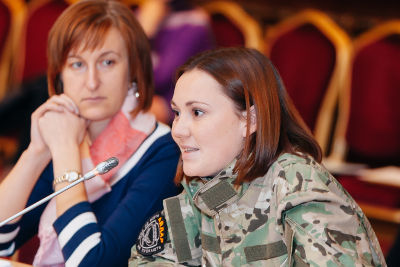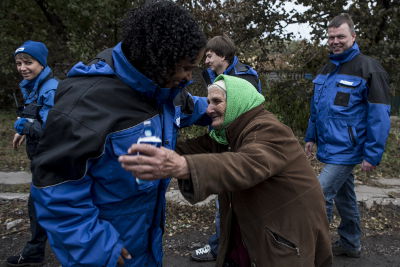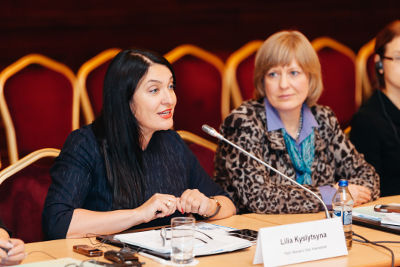Women must play active role in Ukraine’s peacebuilding and post-conflict recovery efforts, say women’s groups
Low numbers of women in senior security positions in peace negotiations a major concern, according to experts at a UN Women-OSCE meeting.Date:

Full participation of women must be a vital component in Ukraine’s peace-building and post-conflict recovery, according to participants in a high-level meeting organized by UN Women and the Organization for Security and Co-operation in Europe (OSCE) Special Monitoring Mission (SMM).
Participants said that low numbers of women in senior positions, particularly in the security sector, was one of the major concerns of the peacebuilding agenda in Ukraine.

“The Minister of Defence should be a woman. I was a soldier who served 14 months at the frontline. A woman minister would understand soldiers’ needs better,” said Ms. Viktoria Dvoretskaya, a former combatant of Aidar battalion.
The meeting, Women’s Participation in Conflict Prevention, Crisis Management and Post-Conflict Reconstruction in Ukraine, aimed to highlight the importance of Ukrainian women’s meaningful participation and leadership in the humanitarian response, recovery and peacebuilding processes to respond to the on-going conflict in Ukraine’s eastern regions of Donetsk and Luhansk.
That conflict has increased insecurity and violence, deepened gender inequality and disproportionately affected women, who make up over 63 per cent of the country’s estimated 1.4 million internally displaced persons (IDPs).

An elderly woman from the mostly deserted and destroyed town of Pisky, Donetsk oblast expresses her gratitude to an SMM monitor during the visit to the village on October 24. Photo: Evegeny Maloletka
Women have been at the forefront of the humanitarian response and service provision to the conflict affected population from the onset of the crisis. Yet they have been generally absent from decision-making over security, conflict resolution and humanitarian responses.
Over 60 attendees from women’s groups, NGOs, UN agencies and the OSCE attended the meeting, held on the 15th anniversary of the landmark UN Security Council Resolution (UNSCR) 1325 on Women, Peace and Security, which calls for women to participate in peace building, be better protected from human rights violations, and have access to justice and services to eliminate discrimination.
A new Global Study on resolution 1325, found that amidst rising extremism globally, women’s role in peace and recovery remains hampered and underutilized.
Participants shared conflict-related gender equality challenges and human rights violation data and discussed the conflict’s impact including gender-based violence and human trafficking on internally displaced women and their families. They identified key opportunities to increase women’s participation in decision-making in Ukraine’s peace-building, security, humanitarian and post-conflict responses. They also reviewed the results of the Global Study on UNSCR 1325.

Lilia Kyslytsyna, a newly elected member of Kramatorsk city council, told that women were the first to start humanitarian and recovery work in the liberated city of Kramatorsk, leading the way to the humanitarian actors. Photo: UN Women/ Andrey Krepkih
Participants cited a rise in domestic violence as a direct consequence of the conflict and called for more support services for both domestic violence survivors and former combatants, many of whom lack jobs, abuse alcohol as a coping mechanism, and suffer post-traumatic stress disorder.
“Hotlines have seen a catastrophic rise in calls from women reporting physical violence, particularly at home,” said Ms. Lyudmila Kovalchuk, vice-president of La Strada - Ukraine, a women’s rights centre. “We have no place to send domestic violence survivors. We should join together to lobby the government to address domestic violence and the war’s other indirect consequences.”
Participants stressed the importance of documenting conflict-related sexual violence and the search for justice.
“Documenting sexual violence is often not feasible in non-government controlled areas,” said Ms. Olena Suslova, director of the Women’s Information Consultative Center. “Yet we have to do it. It is important for women who were sexually assaulted to seek justice. It is important for us, as we want justice!”
Calling for more investment to strengthen the participation of women in conflict resolution and recovery, participants argued that this would pay dividends in the transition to peace.
“Women’s groups need more support from our development partners if we are to successfully get more women involved in peace and security dialogues,” said Natalia Karbowska, Chair of the Board, Ukrainian Women’s Fund.
“The significant potential of Ukrainian women’s organizations, self-help initiatives, volunteer groups and women leaders needs to be further harnessed. It’s crucial to invest in women so they can directly shape conflict resolution and peacebuilding,” said Ms. Anastasia Divinskaya, UN Women Gender Advisor in Ukraine.
“We need more training for mediators and peer-to-peer training programmes for those involved in dialogues on women, peace and security. We need to regularly meet and exchange experiences and resources. We need this!” concluded Ms. Vladislava Kanevska, Ukrainian National Mediators Network.
UN Women works to implement the women, peace and security agenda in Ukraine by building on the important work done by women’s groups, by improving quality and access to gender statistics for humanitarian needs assessment and planning and by engaging women in early recovery, dialogues and peace building efforts.